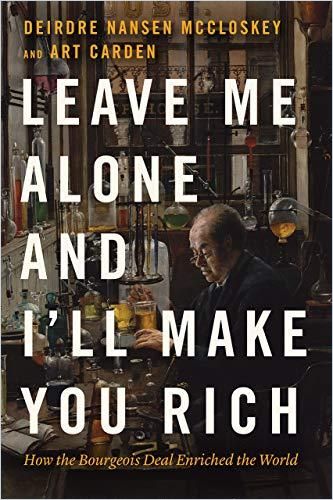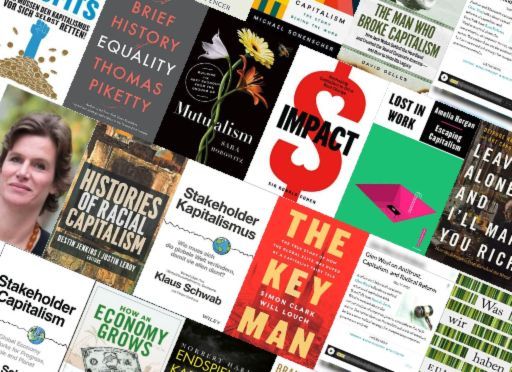Professors Deirdre N. McCloskey and Art Carden defend free markets and argue their effects are predominately positive.

Strident Support of Free Markets
Distinguished professor emerita of economics and history at the University of Illinois at Chicago Deirdre N. McCloskey and professor of economics at Samford University Art Carden write in a surprisingly informal and conversational style about thorny, complicated matters. The authors make their case for free market economic liberalism, which they suggest should be called “innovism.” They debunk competing narratives of economic development, seeking to enlighten readers on how economic progress comes from ordinary people bettering themselves through “the Bourgeois Deal.” Acolytes of Adam Smith and Ayn Rand will welcome this ideological, full-throated defense of the market’s “invisible hand.”
Pessimists
The quality of most people’s lives has improved steadily and radically since the 1800s, and especially since the 1950s. The biggest winners of capitalism have been the poor of the world, McCloskey and Carden note. In the 21st century, life expectancy, education and food consumption continue to improve worldwide.
After every one of the six biggest financial crises since 1800, the air has been thick with spooky stories about the end of betterment and the corrupting effects of consumerism, exploitation, economic maturity, environmental decay and inevitable inequality.Deirdre N. McCloskey, Art Carden
Those raising concerns over environmental issues exaggerate the dangers to humans and undervalue the resource advances a liberal economy can provide. Incomes will rise over the next 100 years, albeit more slowly, while innovation – the authors strive to convince you – will diminish climate change effects.
The “Great Enrichment”
Liberalism has led to massive advancements. Individuals are free to change jobs, try novel business ideas, and offer new goods and services.
The vision in our modern liberalism is of educated and venturing adults, able to take pretty good care of themselves and their families and to provision their neighbors in voluntary exchange.Deirdre N. McCloskey, Art Carden
But when societies move away from the norms of liberal markets, allocations of resources then depend on arbitrary factors like parentage, racial status or party membership. Free markets serve ordinary people, offering the most effective “voice for the voiceless,” the authors claim.
European market liberalism emerged in the 1600s in Holland, where middle-class merchants and tradespeople gained economic freedoms. The spread of literacy pushed liberalism across borders, as revolutions and revolts undermined established powers.
Widespread Dynamism
Coal, iron, railways and farming each contribute a few percentage points to a higher standard of living in a country’s Great Enrichment. But the thousands of percentage points of improvement many nations have experienced derive from the widespread dynamism of individuals free to improve a productive economy.
The authors debunk the idea that capital accumulation fuels progress. Traditional accumulation relies on raising savings by cutting consumption. But in the 18th and 19th centuries, the British grew rich by investing in new ideas.
Liberals know that the future depends on unpredictable ideas from free humans… ‘Capitalism,’ and the associated idea that accumulating capital is the watch spring of enrichment, needs to be retired.Deirdre N. McCloskey, Art Carden
Good investment ideas are abundant; thus the authors prefer to call the modern economic system “innovism,” not capitalism. Economists mistakenly credit education and science for the Great Enrichment. Advances in standards of living, McCloskey and Carden believe, came from individuals tinkering and experimenting.
Imperialism, Exploitation and “Bourgeois Dignity”
The authors protest against those who connect the caricature of capitalism with the human enslavement and colonialism of the 17th, 18th and 19th centuries. Both enslavement and the subjugation of one country by another were regular features of human history, they posit, but improvements in living standards did not always follow: For example, though Spain and Portugal were successful colonizers, their domestic populations remained impoverished.
From 1800 to the present, the places that listened to profit made money, yes, but they enriched everybody by it. Leave me alone, to profit, and I’ll make you rich.Deirdre N. McCloskey, Art Carden
Until the 1700s, many cultures viewed the trades and mercantile occupations as activities for the lowborn. Bravery in battle, status in the church, aristocratic heritage and land ownership generated social status. First in Britain and then in Europe, social attitudes gradually came to value merchants and businesspeople, nurturing a bourgeois dignity that honored fair dealing and trustworthiness.
Adam Smith
The authors argue that critics too readily associate 18th-century philosopher Adam Smith with the greed-is-good mentality. In fact, his writings explain how society should deal with the conflicting interests inherent in any economy. Smith illustrates how competition keeps businesspeople in check while they benefit their communities.
Adam Smith…is the hero of our book. Though he wrote two and a half centuries ago, he is fresher than today’s newspaper.Deirdre N. McCloskey, Art Carden
Smith remains relevant because he was the first to argue that free market prices in a well-functioning, competitive economy signal where best to direct labor, capital and raw materials. Orderly markets, free of coercion, produce the “sweet commerce” that civilizes society.
“The Bourgeois Deal”
In 2020, the average per capita rate of production and consumption was some $130 per day in the United States; the world’s average was about $33. The reason for that disparity, the authors repeatedly maintain, is economic liberalism. Since the 1990s, a Great Enrichment has burgeoned around the world. All countries benefit from the industrialization of other nations.
Eliminating poverty can happen only by further extending the Bourgeois Deal to the rest of the world. Businesses voluntarily making investments and convincing consumers to buy their products are more likely to lead to fair outcomes than relying on politicians in coercive governments are.
As Ayn Rand’s character John Galt says in Atlas Shrugged when asked for a plan to get the economy going, Get the hell out of my way!Deirdre N. McCloskey, Art Carden
Those who criticize the fortunes of Jeff Bezos or Sam Walton should remember that, for every dollar of profit they earned, consumers benefited substantially from their innovations.
Smith & Rand
McCloskey and Carden preach to the choir, incessantly and stridently. They admire and praise Ayn Rand; that should be sufficient criterion for you to decide whether you are a part of that choir. Others may find their arguments to be astonishingly – for economics professors – superficial, ideologically driven, unconvincing and pitched in a tone better suited to partisan media outlets than, say, a university classroom. If that is your kind of tone, you will enjoy their work; if not, you won’t.
Deirdre N. McCloskey’s books include Bettering Humanomics, Crossing, Bourgeois Dignity, Why Liberalism Works and The Bourgeois Virtues.





